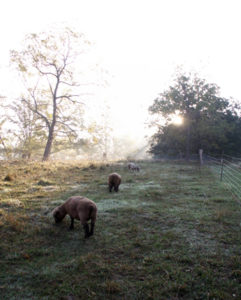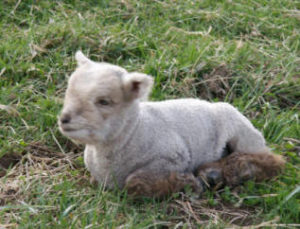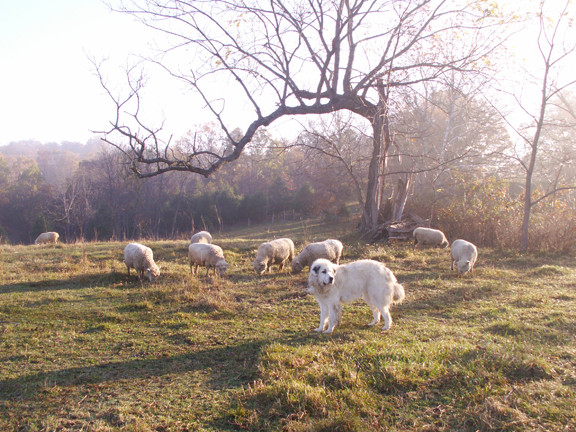Their Small Size:
Adult Babydoll Southdown Sheep are 17″ to 24″ at the shoulder. This makes them much easier to handle than many other farm animals. Their small size is less intimidating for children and they make ideal 4-H projects.
To keep them enclosed, fencing does not need to be high. In fact, we use “hog panels” often for temporary fencing, which taller people can step over. Since Babydolls do not challenge fencing as much as most sheep, your fencing concern will primarily be protection from predators–dogs, coyotes, etc. Predator-proof fencing is necessary when they are not being monitored.
The recent trend in agriculture toward smaller acreages gives the Babydolls an important place in the new rural lifestyle. They are fuel-efficient lawn mowers and will keep enclosed areas looking tidy, including your “edgings”. For suburban properties, they make charming “living lawn ornaments”. For farmers utilizing a multi-species rotational grazing scheme, they work well.
Temperament:
Babydolls are sweet. They are peaceful, curious, intelligent, and like to interact with each other and “their people”. Being an animal that is Prey rather than Predator, they are apprehensive about new situations and new people–it is part of their protection. With time and patience, they become more trusting. Hand feeding is a good way to build a relationship faster. Just spending time with them will also do wonders. When they are comfortable turning their backs to you and spend some time ignoring you, you’ll know trust is being built. Soon, there will be no doubt about who their “favorite” person or people are! Babydolls like routine, so with forethought that can be used to your advantage in caring for them. Each individual is unique, and you will learn their various personalities. If you want a couple of Babydolls as pets, it will be easier if they have been socialized quite a bit to people while they were young. This happens with bottle-fed babies, but also with lambs raised by their mothers when the shepherd makes an effort to spend a lot of time around the lambs. Babydolls are a flock animal, so it is NOT a good idea to ever single one out. Even when we had only one ram, he was kept with a wether (neutered ram) for company if he was separated from the ewes. If your purpose is other than breeding, two wethers make good pets and are generally less expensive. Since the male lambs tend to be more confident, they can become very friendly with only minimal encouragement. It won’t take long for them to come running (bouncing) to you as fast as their little legs will carry them, calling the whole way, when they see you. They are wonderful easy-going companions for people, but remember that they also need companions in each other.
Hardiness:
Despite their cuteness and smallness, Babydolls are hardy. They are one of the ancient breeds which means they are not as prone to many of the problems associated with modern breeds. They are resistant to foot rot and intestinal parasites. They are good at foraging and do well on small amounts of good quality hay. The ewes often have twins and generally lamb without difficulty.
They have a strong flocking instinct, so tend to not wander. Their life span is typically 12 to 16 years. Although they are short, they are actually quite stout. They will impress you with their strength if you ever need to work on one, especially before it has learned to trust you! Babydolls have only two aggressive moves. One, is to butt another with its head (they are naturally polled, which means they do not have horns). You will occasionally see this when they both want to eat the same food. The other move is to stomp a front foot. This is always in response to perceived danger–strange dog, etc. It always strikes me as funny, since they are truly so defenseless–but I’ve seen lone dogs back off several times, so it must make them think twice. (Dogs are the most common predator of sheep, so always be mindful of how things can turn out, especially if you ever see dogs running loose in your area.) Even though Babydolls are hardy, they obviously should be routinely checked and cared for to offset any potential problems early.
Productivity:
Babydoll Southdown sheep are fuel-efficient mowers and edge-trimmers. But they have another advantage over the mechanical models. They are also a great source of organic fertilizer! They spread small pellets over the newly trimmed grass as they go. It drops through the blades of grass to ground level instead of the large clumps (like most animals) that usually smother and kill the vegetation they land on. This means your lawn/field will be trimmed without unsightly “patties” or “burn spots”, and you won’t need to step carefully. It has been written several places that Babydolls have been used with success in orchards, berry farms, and vineyards as they will not harm the fruits, girdle trunks, or harm shrubs. In our experience, we have found there are certain plants they enjoy quite well–rose bushes are one of them. It is my advice to watch your Babydolls closely if you are putting them in an area with other plantings until you get a feel for what they are prone to eat. You may be surprised! There are some plants that they prefer not to eat if good grass is available, but when that runs out, they start to work on the next best option. As always, they are just being themselves. It is not their fault if we don’t like what they’ve eaten in an area we have put them in.
Babydolls will be glad to give you the “coat off their back” each spring. Their wool is one of the finest wools of all the British breeds. It is short (typically 1.5 to 2.5 inches) and springy, soft and bouncy, with a surprisingly strong underlying disposition. The micron count typically ranges from 24 to 29. It has more barbs per inch than other wool types, making it an ideal blend with either angora rabbit or angora goat for spinners. Its ability to felt is very low.
Another way Babydolls could be productive (although hardly worth mentioning here) is that they have select carcass value for the table, an attribute not shared by most other miniature breeds (which are typically wool breeds). We do not sell our sheep for this purpose.
Next: Their History





